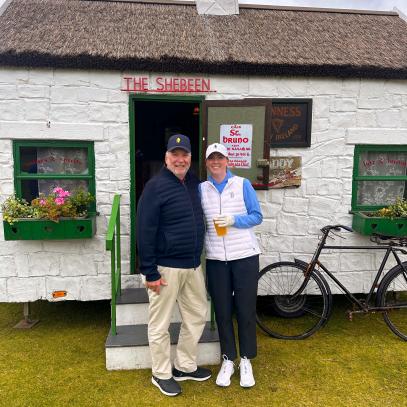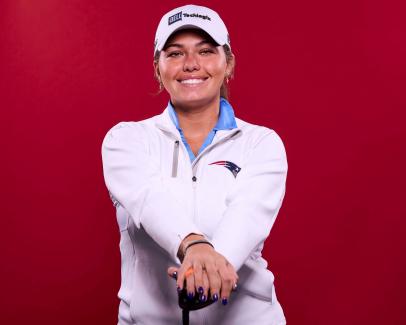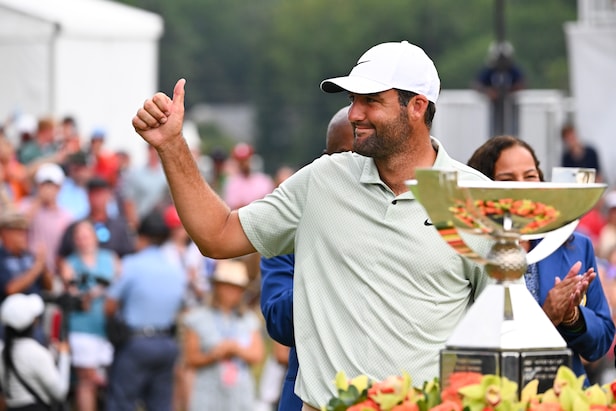Holy coach: How did a minister raise four PGA Tour winners from one high school? – Australian Golf Digest

- by Admin
- September 5, 2024

The numbers get you close to a story but are too indifferent to describe a life. From 1997 to 2008, King Oehmig might have been the most successful high school golf coach in America. At his alma mater, Baylor School, a private boarding and day school in Chattanooga, Tenn., Oehmig’s teams won 21 state championships. This included five girls winning 11 individual state championships and three boys bringing home four individual titles. Four of the boys he coached—Luke List, Keith Mitchell, Harris English and Stephen Jaeger—have all won on the PGA Tour and one of the girls, Brooke Pancake Rende, won the girls’ state title four years in a row before attending Alabama, winning a team NCAA title and then playing on the LPGA Tour.
In addition to coaching golf, Oehmig’s other calling was as an Episcopalian minister. Former players recall the sight of him cresting the hills of golf courses in his clericals when he didn’t have time to change, and other teams struggling to determine who this figure was.
Oehmig’s methods were simple. He found talented boys and girls and pushed them to compete with one another, and with other teams, and then sought out other mentors who could help shape their golf games. Yet in other ways he was complicated and unconventional. Any secrets of his coaching success are now gone with him. In 2015, King Oehmig died from a heart attack while fishing alone at age 62.
MORE: How many tour golf coaches can break 80?
“Having been around death a lot as a minister, he told me more than once that if he had a choice, he would go out swinging a golf club or casting a line. He got his wish, just way too soon,” his widow, Margy, wrote to me. The impression she gives of her late husband is that of a free spirit and child of the 1960s. “He was a man of many talents. He was also a man that you had to expect the unexpected with. I mean, the fact that he went into the ministry was not exactly a life path you would’ve thought he would’ve chosen through high school and college.”
Oehmig’s father, Lew, could have been a professional but chose a life of business golf entertaining clients in the banking and insurance industries. He won the Tennessee State Amateur eight times and the Senior Amateur seven times, both records. He won the U.S. Senior Amateur Championship three times and, until 2003, held the title of oldest USGA champion, having won the U.S. Senior Amateur at age 69. Lew was also a Walker Cup captain, and in 1994, the USGA awarded him its highest honor, the Bob Jones Award.
Margy says, “King was a good golfer, and he liked to say he just wished more of his dad’s golf skills had trickled down.” King was a fine player, who played at the University of Virginia and competed in local and state amateur events all his life.
“His love for golf stemmed out of his love for my grandfather and growing up and playing with him and idolizing him,” says Henry, King’s oldest son. Henry and his younger brother, John, both live in Chattanooga and together own and operate Alchemy Spice Company, which sells artisan spice blends.
Luke List says what impressed him most about King was the way he was always searching to get better in his own game. “He was still playing at a pretty high level, but he would always say, ‘I found a secret; I found it today,’ and it was always something different.”
“I always thought he was overqualified for what he was doing,” says Keith Mitchell. “It was rare that you had somebody with that much golf knowledge and history and passion for something like high school golf. A lot of golf programs are just another faculty member that happens to be the golf coach. He was truly a golf coach, and I don’t mean swing technique. He cared so deeply about golf as a sport and that kind of really translated into us as his players.”
Being a man of the cloth did not temper his competitiveness. King had the letters OAC OAW stitched onto the team’s hats, which stood for “Open a Can of Ass Whup.” Before matches, he pantomimed the gesture and sound of opening a can. Says Jaeger, “He just had that fire and drive to beat everybody.”
John Oehmig contends much of his father’s behavior was tongue-in-cheek, shock value for high school kids. When asked how he squares his father’s desire to win with his commitment to faith and service to his ministry, John says, “That’s the enigma of my father, honestly. That’s what made him so interesting and such a friend to so many and a delight.”
GLORY DAYS: Coach King Oehmig (bucket hat) kneels with his team that included future pros (clockwise in yellow circles from top left) Stephen Jaeger, Keith Mitchell and Brooke Pancake Rende.
Few other high school golf coaches of this era spent as much time hanging out at junior tournaments. Luke List met Oehmig at such an event. “I was 14 years old coming out of eighth grade. I chose to spend my first year in high school away from my family and board at Baylor. It was a big decision at a young age, but I think King saw something in me, and I wanted to pursue college golf.”
Mitchell says the first time King saw him play was in sixth grade: “It wasn’t just me. It was everybody in middle school that he went out to watch.”
After List graduated, Mitchell, Harris English and Stephan Jaeger all played on the same team one year. To a man, all say learning how to win began at Baylor and with Oehmig.
“He got you ready to play, not that you have to get psyched up to play golf,” Jaeger says. “But he got you mentally prepared to go out and hit shots and shoot a score.” The preparation began with annual trips to Orange County National Golf and Lodge in Orlando, where the team worked with swing coaches to dial in mechanics. English recalls how one year they received a motivational visit from psychologist Bob Rotella on campus. “He brought in a lot of big-time people from all his relationships throughout golf to help us be as good as we can be.”
King took the teams to tournaments far beyond Chattanooga, pushing them to think beyond local glories. “He never wanted us to get comfortable, and so he would try to find the best tournaments,” Mitchell says. “He just wanted us to compete against the best. He never let us believe we were that good. He always wanted us to believe that we could be better.”

RIGHTEOUS RECORD: While at Baylor School, Harris English won the 2005 Tennessee individual state title and four team state titles.
Michael Reaves
The other great pull of King’s golf life was Lookout Mountain Golf Club in Georgia, where he helped lead a movement with his friend Doug Stein to restore the Seth Raynor-design. Stein remembers fondly theological discussions with King, but more of their time together was spent talking golf architecture, as they co-founded the Seth Raynor Society and went on many road trips to his courses. Gary Chazen, a childhood friend who played junior golf with King, says the pious aspect of his life rarely came up when they later played golf as adults. The game was a chance for King to take that hat off.
Margy and King didn’t date in high school, but she remembers a pivotal Thanksgiving when King returned from the University of Virginia “completely broken.” He told her about a bad trip he had had on LSD, and when he returned to school, he began studying transcendental meditation. “He would go to a chapel down the street from his fraternity house just to have some quiet and be able to do his TM. Often, when he was there, the organist would be practicing, and he was sort of transported to another realm.” The Bible verse King would later tether to the moment of his epiphany is from Matthew 7:7. “Ask and it will be given to you; seek and you will find; knock and it will be opened to you.”
A couple years earlier, when King had graduated from high school, he made a double vow “that he would never send his sons to Baylor School nor would he darken the door of a church again,” Margy says, laughing (both their sons would attend Baylor). When King was enrolled at Baylor, it was a military school with uniforms and “very structured and almost brutal,” according to Margy. She also says that King had grown up in a conservative Presbyterian church where there was a lot of “judgment placed on people.” This was the young man, confounded by rigors he wouldn’t abide, who found himself in that church in Charlottesville, asking his question of God. The reply for her late husband, Margy says, came in the form of feeling. “He was bathed in this warm, warm light that just surrounded him with this comforting presence of love and light.”
After graduating from Virginia, King’s first job was for Houston Bottling in Texas, arranged by Jack Lupton, founder of The Honors Course, who was a friend of his parents and had made his fortune as a bottler for Coca-Cola. While there, King became involved in an Episcopal church, and that is when he first became serious about entering the ministry. He came home to attend the seminary at the University of the South and then began living the life of a priest, moving, and serving congregations of all sizes and shapes but always drawn to smaller parishes. “He was never conventional,” John says. “He was never trying to climb the ladder. He was never out to be in the biggest parish or the most popular church.”
When King moved back to Chattanooga, he founded Synthesis Publications, which put together liturgical readings for Episcopal services. John says that was an example of his father’s “entrepreneurial spirit” but also indicative of him following his own will. “I don’t know if that was his problem with authority or if it was just him never settling for anything conventional. He was always looking to do something that inspired him but also helped others.”
‘KING HAD A PENCHANT FOR ZEN STORIES, PARTICULARLY PARABLES OF ACCEPTING THE WORLD AS IT IS RATHER THAN HOW YOU WANT IT TO BE.’
Both sons say their father was a person who accepted all, and John speculates that’s because King had his own sense of being an outsider. King had a penchant for Zen stories, particularly parables of accepting the world as it is rather than how you want it to be. Stein’s favorite was King’s telling of a man who is on the verge of losing his job, his wife and the respect of his children. He goes off in search of the Zen master and is turned away by the monks, but he persists and pleads, even threatening to cut off his finger if he can’t see the great man. Still denied an audience with the great man, he follows through on the threat and is then rushed inside. He tells the Zen master his struggles, and the Zen master tells him that for the next year, in the face of his disappointments, he should reply with this phrase. “Thanks very much for everything. I have no complaint whatsoever.”
A year passes, the man returns to the Zen master, and all that he was worried he would lose he has lost. He tells the Zen master, “I have lost my job. My wife has left me. My children will not talk to me.” The Zen master looks him in the eye and says, “Thanks very much for everything. I have no complaint whatsoever.”
Stein’s eyes fill with tears as he finishes the last line. “That story changed my life.” The moment King first told it to him was the year his family business, founded by his father, entered bankruptcy. “The world was collapsing all around me,” and the lesson of the story—that life endures amid great loss and we must endure, too—was as powerful as its teller. Connie Evans, a member of Episcopal Church of the Ascension in Cartersville, Ga., says King’s gift as a minister was his ability to never stand in judgment. “He was completely unflappable, and he had a way of being right there with you. In times of crisis, you felt he was walking with you.”
On their travels to Raynor golf courses, King would make Stein laugh with his whimsical nature. “We pulled into a club one time, an important club, and King parked in a spot reserved for the club champion. He got out and started walking in and someone called to him, ‘You can’t park there.’ King said, ‘Thanks, man,” and kept walking. He did stuff like that all the time.” It was with a similar ease that King might walk through a hospital and flash a peace sign to a passerby and say, “Peace of the Lord be with you, man.”
MORE: The 50 Best Teachers in America (2024-’25)
His sense of fun may or may not have always been intentional. Brooke Pancake Rende—the youngest golfer ever inducted into the Tennessee Golf Hall of Fame, at 17—remembers King in the trees during matches in yoga poses. A former smoker, King often took golf pencils and held them as cigarettes, even putting them to his lips. He did it so much, one year the team presented him with a pack of pencils at the team’s year-end banquet.
Nancy Johnson, who served as King’s assistant coach to the girls team for years, says King had a somewhat manic personality, not keen on details, a sort of nutty professor. “King was a big-picture kind of person. He found it tiresome that he had to go to the business office and get a check cashed to take the kids out or keep records of money spent on the golf program.” One time, he went into the business office needing a copy of a check. King asked where the copier was and someone pointed to the wall, where it sat among other machines. “He goes and puts it in the machine, and he says, ‘Well, now why isn’t it coming out? Where does it come out?’ He would put it in the shredder, so they had to cut him another check and get two people to sign it.”

TEAM SPIRIT: Most of the Baylor team was at Winged Foot to cheer Luke List when he finished runner-up in the 2004 U.S. Amateur.
Michael Cohen
Another time he was asked by the girls to go through a fast-food drive-through. Rather than order through the microphone, he simply pulled up to the window. “He gets to the window, and he says, ‘Hey, how you doing? ‘The woman says, ‘Fine, and how can I help you?’ The kids are just falling apart laughing that he did not know how to do a drive-through.”
However, Johnson’s favorite story is the 1999 Masters. “He promised the girls that if they won the state championship, he would take them, and they did,” Johnson says. “He had these passes because of his father that got you access everywhere,” including driving down Magnolia Lane, where an attendant took care of their vehicle.
At the day’s end they walked onto the driving range where Payne Stewart was hitting balls. “He just goes, ‘Hi, Payne, I’m King Oehmig.’ He said it in such a way Payne thought he should know who he was. King goes, ‘How are you doing, Payne?’ and Payne says, ‘King, it’s so good to see you. How are you doing?’ ” Oehmig then introduced each girl and Johnson, telling Stewart they were the Tennessee state champions. Stewart eventually walked with them out to their car, where they all said goodbye. Stewart would die six months later in a plane crash.
Rende recalls how King could keep things light, coming up to her before important matches and saying, “All right, Cakes, let’s get this done today.” She says he was always there for her, particularly after her father died her senior year. “He hit all of us at a pivotal point in our lives. He poured into me as a person, and when I lost my dad, he really stepped in for me in that way as well.”
Without telling her, King drove to watch Rende compete in Q school and win her card. “He didn’t give a heads up. He just stayed the entire time to watch me get my tour card. I hope he’s looking down and can hear, still to this day, that was one of the most impactful things in my life, to have him there supporting me and just knowing that he had seen my dreams all the way through with me.”
The four boys on tour, now men, keep up with Margy, and all get right back to her whenever she texts. Jaeger came through with practice tickets to the Masters this year. Margy says, “King would just be so proud of them and so excited that they are living their dreams, and maybe also fulfilling a dream he had for them.”
Though Henry and John don’t play as much as their father did, golf is their link to him in the same way it was King’s link to Lew. Says John, “I don’t think he loved the game so much for what it was. Not for status, not for anything more than pure golf. He loved the competition. He loved the spirituality of golf and the Zen of golf. Like life, golf is something you can never master, but every round is different. Every round you’re going to learn something and probably lose something and then maybe find it on another round. He found a lot of solace in that.”
More From Golf Digest+  Golf Digest Logo Glory’s Cost: Will money ruin the chase for golf greatness?
Golf Digest Logo Glory’s Cost: Will money ruin the chase for golf greatness?  Golf Digest Logo How much golf is too much golf? Let’s find out
Golf Digest Logo How much golf is too much golf? Let’s find out  Golf Digest Logo How Alexa Pano went from Netflix star to the LPGA Tour
Golf Digest Logo How Alexa Pano went from Netflix star to the LPGA Tour
This article was originally published on golfdigest.com
The Latest News
-
January 4, 2025Horse Racing News: Holymanz strikes again at Geelong races
-
January 4, 2025Australia coach calls out ‘intimidating’ India celebrations, reveals Konstas chat
-
January 4, 2025Bumrah under cloud as India reveal back spasm | cricket.com.au
-
January 4, 2025Biggest curveball of summer that could decide series; Beau ‘earns his stripes’ in coming of age: Talking Pts
-
January 4, 2025‘Got a spell on him’: Inside King Kohli’s last stand… and one regret he will have after Boland blitz




